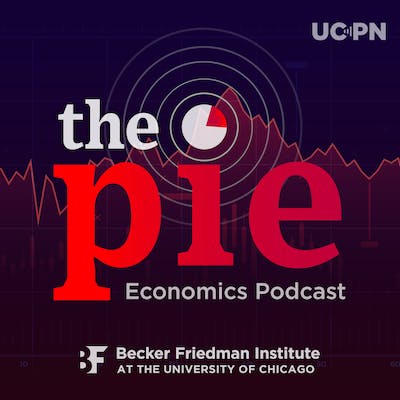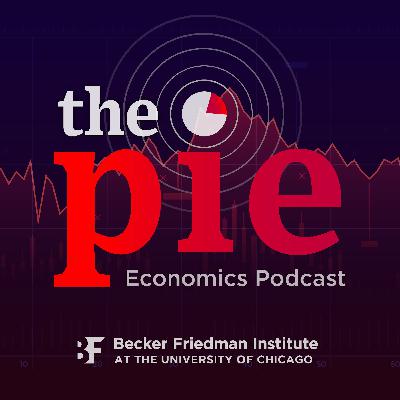Discover The Pie: An Economics Podcast
The Pie: An Economics Podcast

The Pie: An Economics Podcast
Author: Becker Friedman Institute at UChicago
Subscribed: 803Played: 16,949Subscribe
Share
© 2021
Description
Economists are always talking about The Pie – how it grows and shrinks, how it’s sliced, and who gets the biggest shares. Join host Tess Vigeland as she talks with leading economists from the University of Chicago about their cutting-edge research and key events of the day. Hear how the economic pie is at the heart of issues like the aftermath of a global pandemic, jobs, energy policy, and more.
63 Episodes
Reverse
A small number of companies are responsible for a substantial amount of the discrimination in today’s labor market. Who are they? In this episode of The Pie, Evan Rose, the Neubauer Family Assistant Professor in Economics discusses results from his recent experiment to measure discrimination among the largest employers in the United States.
When the Great Recession hit in 2007, it produced the largest decline in US employment since the Great Depression. It also substantially reduced mortality. In this episode of The Pie, Matt Notowidigdo discusses how economic downturns can lead to valuable health gains that may even offset some of the negative consequences of recessions.
This episode of The Pie features a panel discussion following a talk from Raghuram Rajan, the Katherine Dusak Miller Distinguished Service Professor of Finance at Chicago Booth, about his book "Monetary Policy and Its Unintended Consequences." The panel included Charles Evans, former president of the Federal Reserve Bank of Chicago, and was moderated by Randall Kroszner, the Norman R. Bobins Professor of Economics at Chicago Booth and former Governor of the Federal Reserve System.
Anti-democratic sentiment is on the rise across Latin America. This episode of The Pie explores the evolving political and economic landscape of Latin America, highlighting the region's experimentation with democratization and the growing threats of authoritarianism. Luis Martinez, Assistant Professor at the Harris School of Public Policy, discusses how economic reforms and pro-market transformations, despite their benefits, have left segments of the population feeling underrepresented and disillusioned.
Children whose parents have college degrees are often more skilled readers than children whose parents didn't attend college. In this episode of The Pie, Harris Policy Professor Ariel Kalil discusses how certain technologies can help improve literacy skills for disadvantaged children.
Russian-born economist Konstantin Sonin, Professor at the University of Chicago Harris School of Public Policy, joins The Pie to provide an update on the economic impacts of the ongoing conflict between Russia and Ukraine. Sonin discusses how the war affects standards of living and output in both countries, and shares his predictions for what the future holds.
Many mines in the eastern Democratic Republic of the Congo are controlled by armed groups that frequently engage in conflict with nearby civilians. In this episode of The Pie, Hans Christensen, Professor of Accounting at Chicago Booth, and Samuel Chang, PhD student in Accounting, discuss what happens when mines become certified as conflict-free. Hint: It’s not what you might expect.
Most observers are convinced that America’s healthcare system needs reform. This episode of The Pie features a discussion among MIT health economist Amy Finkelstein, former commissioner of the US Food and Drug Administration and current Duke professor Mark McClellan, and professor at the Harris School Joshua Gottlieb on what these reforms should entail. Michael Greenstone, director of UChicago's Climate and Energy Institute, moderated the conversation.
What happens to humans when vultures go extinct? Why did the student loan pause increase debt? Plus, do government benefits change how parents invest in their kids? To wrap up 2023, Tess Vigeland reviews some of the economic research we've featured on the show throughout the year. Plus, a word from the UChicago team behind The Pie.
Women who have unplanned births experience earnings losses of up to 25%, while planned births reduce earnings by roughly 15%. Yana Gallen, Assistant Professor at the Harris School of Public Policy, joins The Pie to discuss her research on how pregnancy timing impacts women's careers.
Would you rather keep things as is, or, remove yourself and all your friends from social media? You aren’t alone if you chose the latter. Recent research from UChicago economist Leo Bursztyn ushers new survey evidence to show how fear of missing out keeps some users online. Learn more on The Pie.
Roughly a quarter of all paid workdays are now done from home, up from 7% in 2019. How did this shift unfold across different areas, industries, and worker demographics? Steven Davis, Professor Emeritus at Chicago Booth and work-from-home expert, joins The Pie to share his research.
The United States imprisons its population at a rate that is on par with North Korea. In this episode, Evan Rose of the Kenneth C. Griffin Department of Economics discusses what happens when this massive subset of individuals rejoins the labor force. Hint: It’s not what you might expect.
The rate of school suspensions has more than doubled for Black and Latino children since 1974, inspiring a small but growing movement aimed at finding new disciplinary solutions that deter undesirable behavior without imparting harm. Harris Policy's Anjali Adukia joins The Pie to discuss her partnership with Chicago Public Schools, and what happened when teachers replaced exclusionary disciplinary practices, such as suspensions, with restorative practices that emphasize community building and restitution.
Police use of force has prompted a national debate around misconduct and how to solve what many believe to be a systemic issue. Harris Policy’s Oeindrila Dube and Chicago Booth’s Anuj Shah partnered with the Chicago Police Department for an experiment that found a different kind of behavioral training could effectively reduce adverse outcomes.
As a massive carbon sink, the Brazilian Amazon plays a crucial role in stabilizing the global climate. It’s also valuable farmland. How do economists measure this tradeoff? Lars Peter Hansen, Nobel Laureate and UChicago economist, joins The Pie to discuss his recent research on how policymakers might make the most of this precious and dwindling resource.
The U.S. government swung into action when the ranks of the pandemic unemployed swelled almost beyond recognition. Three years on, economists are continuing to study the effects of the largest increase in unemployment benefits in U.S. history. The Harris School of Public Policy’s Peter Ganong and Chicago Booth’s Joseph Vavra join The Pie to discuss the impacts on spending and job-finding.
How much effect do government policies have on doctors’ wages? And when those wages are high, does it drive inequality in other jobs? And how does Taylor Swift factor in? Or Beyoncé? Joshua D. Gottlieb of the Harris School of Public Policy joins The Pie to discuss his research using detailed data to study earnings and how they’re influenced by forces like public policy and rising inequality.
When the Los Angeles Unified School District combined some neighborhood high schools into Zones of Choice, schools had to compete for students. The result? Achievement gaps narrowed, and more kids reported that they liked school. Chris Campos of Chicago Booth joins The Pie to discuss the results of a new study.
The use of cryptocurrency is on the rise, but who exactly is on the bandwagon? Chicago Booth’s Michael Weber has examined the crypto market – who’s in it, why they believe in it, and what it might mean for the future. He joins The Pie to share the surprising (and also unsurprising) findings.












this is the dumbest conversation I've heard recently
don't think she would have taught a second class at my university...
At no point in the podcast do the authors offer the option of west reducing per capita energy consumption to offset rising energy production by the east. why dont you guys reduce your per capita consumption and meet us in the middle so everyone has same per capita consumption.
thanks castbox for subscribing me to this podcast without my knowledge